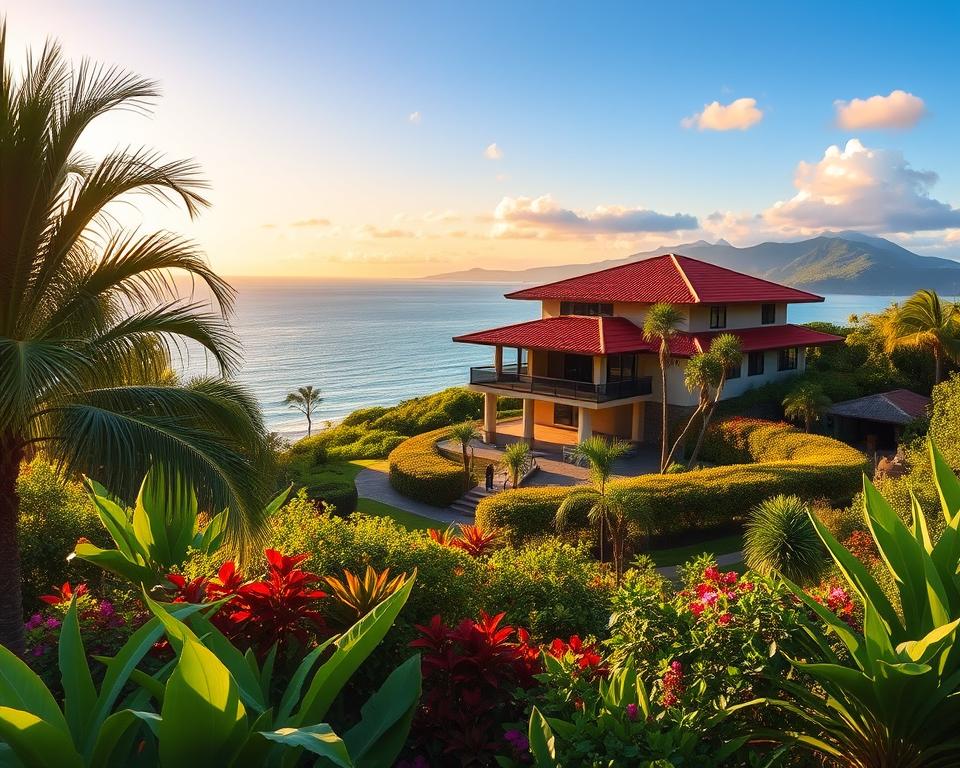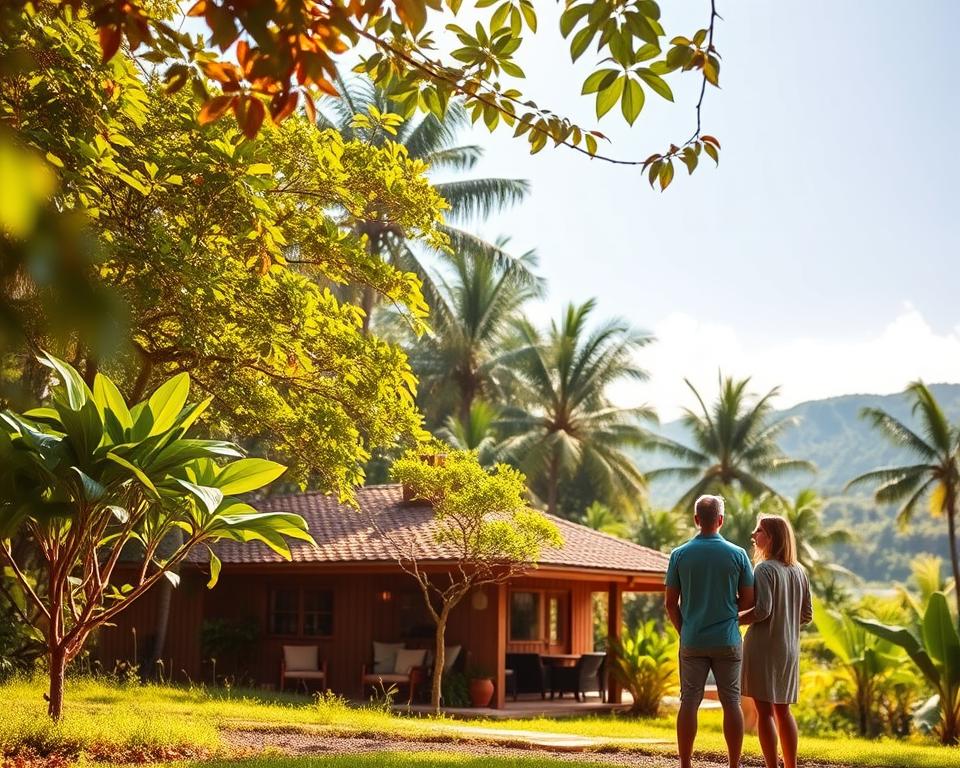Buying a House in Costa Rica’s Competitive Market? We Can Help
Costa Rica’s real estate market is experiencing a surge, with foreign investment in property reaching record levels. This trend is driven by the country’s stable political environment, stunning natural beauty, and favorable conditions for foreign buyers.
At Gap Real Estate (Grupo Gap LLC SRL), we’ve seen firsthand the complexities of navigating Costa Rica’s competitive property market. With over two decades of coast-to-coast experience, we simplify the process of buying, selling, or investing in Costa Rica.
Our comprehensive guide will walk you through the essentials of purchasing property in Costa Rica, covering legal requirements, regional considerations, and financial aspects. Whether you’re seeking a vacation home, retirement property, or investment opportunity, we’ll provide the insider knowledge you need to succeed in Costa Rica’s dynamic real estate market.
The Current State of Costa Rica’s Real Estate Market
With a projected GDP increase of 3.9% in 2024, Costa Rica’s property market is poised for continued growth, attracting both local and foreign investors. This economic expansion is driven by business confidence and foreign direct investment, particularly in sectors such as tourism and technology, which in turn fuels the demand for properties.
Market Trends and Growth
Costa Rica’s real estate sector is witnessing significant trends that are shaping its market. The post-pandemic era has seen a notable increase in property prices, especially for larger properties and those in proximity to beach areas. Our analysis indicates that the market is experiencing:
- Increased demand for properties due to the country’s economic growth
- Significant price increases, particularly for luxury and beachfront properties
- Rising construction costs due to higher demand for materials and labor
Why Costa Rica Continues to Attract Foreign Buyers
Costa Rica remains an attractive destination for foreign buyers due to its political stability, natural beauty, well-developed infrastructure, and favorable climate. Additionally, the country’s commitment to sustainability and renewable energy sources enhances its appeal to environmentally conscious investors. Foreign investment continues to flow into Costa Rica, particularly in the technology and tourism sectors, further driving the real estate market.
The combination of these factors makes Costa Rica a preferred destination for North American and European buyers, who are drawn to its:
- Stable political environment
- Biodiversity and natural attractions
- Modern infrastructure
- Eco-friendly policies and practices
Can Foreigners Buy Property in Costa Rica?
As a foreigner, buying property in Costa Rica can be a straightforward process if you understand your legal rights and the exceptions that apply. Costa Rica is known for its welcoming attitude towards foreign investors, and the country’s laws reflect this openness.
Legal Rights for Non-Residents
Non-residents of Costa Rica have the same property rights as local citizens. You, or a corporation, can own property in Costa Rica without the need to include a local resident as a co-owner, which is a requirement in some other countries. This straightforward approach makes it easier for foreigners to invest in the country’s real estate market.
The legal framework in Costa Rica protects foreign buyers and ensures secure property transactions. Understanding your legal rights is crucial for a smooth transaction.

Maritime Zone Restrictions
However, certain exceptions exist, particularly in designated areas known as Maritime Zones, which include beachfront locations and are considered public land. In these areas, foreign individuals can own up to 49% of the property through a corporation, such as an LLC. It’s essential to understand the distinction between titled property and concession property when buying land in coastal areas.
Understanding these restrictions is vital for foreign buyers to navigate the complexities of Costa Rica’s property market successfully.
Understanding Costa Rica’s Competitive Property Market
Costa Rica’s property market is becoming increasingly competitive, making it essential for buyers to understand the current landscape. As foreign investment continues to pour in, the demand for properties in desirable locations has skyrocketed.
The northern Guanacaste region, particularly areas like Papagayo, Playa del Coco, and Playa Hermosa, remains the most popular among foreign nationals. This region ensures that your property will, at a minimum, hold its value.
High-Demand Areas and Property Types
The high-demand areas across Costa Rica include not only the northern Guanacaste region but also the Central Valley and emerging hotspots. Understanding which property types are most sought after, such as beachfront properties, mountain views, or urban condos, helps buyers focus their search effectively.
Beachfront properties in areas like Tamarindo and Nosara are highly coveted, while mountain retreats in places like Atenas and Grecia offer a cooler climate and stunning views. Urban condos in San José are also in high demand, particularly among those looking for a more urban lifestyle.
Factors Driving Competition
Several factors drive the competition in Costa Rica’s property market. Limited land availability in desirable areas, increasing foreign investment, and a growing interest in remote work-friendly properties all contribute to the competitive environment.
Tourism trends also impact property demand, creating both challenges and opportunities for buyers in different regions. Seasonal fluctuations affect the market’s competitiveness, making it crucial for buyers to time their purchases strategically.
Understanding these competitive dynamics helps buyers prepare appropriate offers and negotiation strategies to secure their desired properties. In multiple-offer situations, which are becoming increasingly common in high-demand areas, being well-prepared is key.
Key Regions for Property Investment in Costa Rica
When considering property investment in Costa Rica, understanding the diverse regions is crucial for making an informed decision. Costa Rica offers a variety of investment options across different regions, each with its unique characteristics and potential for growth.
Guanacaste and the Gold Coast
Guanacaste and the Gold Coast region are known for their beautiful beaches and growing expat communities. This area is popular with tourists and expats, making it an attractive option for property investment due to its strong rental potential. Luxury developments and high-demand areas like Tamarindo and Playas del Coco contribute to the region’s appeal.
- Beautiful beaches and luxury developments
- Strong rental potential due to tourism
- Growing expat communities
Central Valley and San José
The Central Valley, including San José and surrounding areas, provides urban amenities, a cooler climate, and proximity to healthcare facilities and international schools. This region is among the most developed in Costa Rica, making it an attractive option for those seeking a more urban lifestyle.
- Urban amenities and modern infrastructure
- Proximity to healthcare and education
- Cooler climate compared to coastal areas
Caribbean Coast
The Caribbean Coast, particularly Limón, offers more affordable property options compared to the Central Valley and Pacific Coast. This region presents a distinct cultural atmosphere and growing tourism potential, although it has different weather patterns from the Pacific side.
- More affordable property options
- Distinct cultural atmosphere
- Growing tourism potential
Southern Zone
The Southern Zone, including areas like the Osa Peninsula and Pérez Zeledón, is one of the most affordable regions in Costa Rica. With rent prices ranging from $200 to $600 per month, this area offers pristine natural beauty and emerging investment opportunities as infrastructure continues to develop.
- Pristine natural beauty and biodiversity
- Lower property prices and rent
- Emerging investment opportunities
In conclusion, each region in Costa Rica offers unique investment opportunities in property. By understanding the characteristics of Guanacaste, the Central Valley, the Caribbean Coast, and the Southern Zone, investors can make informed decisions that align with their investment goals and preferences.
Types of Properties Available in Costa Rica
From beachfront properties to rural farms, Costa Rica’s real estate market is rich in options. This diversity allows buyers to choose properties that best fit their lifestyle, investment goals, and preferences.
Costa Rica’s property landscape includes various categories, each with its unique advantages and considerations. The range of properties available caters to different needs, whether it’s for investment, personal use, or a mix of both, ultimately affecting the value of the investment.
Beachfront Properties
Beachfront properties in Costa Rica are highly sought after for their prime location and potential for rental income. These homes are ideal for those who wish to enjoy the country’s beautiful coastline and are often considered valuable properties in terms of land and location.
Mountain Retreats
For those seeking a more tranquil environment, mountain properties offer stunning views and cooler temperatures. They are often more affordable than beachfront options and are popular among retirees and remote workers.
Urban Homes and Condos
Properties in urban areas like San José provide convenience and access to amenities. These homes are suitable for those who prefer being close to shopping, dining, and entertainment.
Rural Properties and Farms
Rural properties offer privacy, ample space, and a relaxed lifestyle. While they may require infrastructure investment, they are often more affordable and provide opportunities for agricultural activities or eco-tourism, making them a valuable property investment in Costa Rica.
- Beachfront properties offer premium investments with strong rental potential.
- Mountain retreats provide cooler climates and stunning views.
- Urban homes offer convenience and amenities.
- Rural properties provide space and a relaxed lifestyle.
Understanding the characteristics of each property type is crucial for making an informed decision. We help buyers navigate these options and identify the best fit for their needs in Costa Rica.
The Step-by-Step Process of Buying Property in Costa Rica
Navigating Costa Rica’s real estate market can be challenging, but knowing the buying process can make it more manageable. We will guide you through the essential steps to purchase property in Costa Rica, ensuring a smooth transaction.

Finding a Reliable Real Estate Agent
Finding a reliable real estate agent is crucial in Costa Rica’s competitive market. We recommend looking for agents with specific qualifications, such as SUGEF registration, membership in the National Association of Realtors (NAR) or the Costa Rican Guild of Realtors Association (CRGAR), and local experience. These credentials ensure that the agent is knowledgeable and operates professionally.
Property Search and Evaluation
The property search and evaluation phase is critical. Buyers should consider factors such as location, property condition, legal status, and potential for appreciation or rental income. Conducting effective property viewings, including visiting properties at different times and under various weather conditions, helps in making an informed decision.
Making an Offer and Negotiation
Making an offer and negotiating effectively requires a clear understanding of local market conditions and a well-planned strategy. In competitive situations with multiple interested buyers, having a skilled real estate agent can make a significant difference. We advise buyers to be prepared to act quickly and negotiate terms that meet their needs.
Closing the Deal
The closing process involves several key steps, including the role of the notary public, execution of the transfer deed (escritura de traspaso), and registration with the National Registry. Understanding the typical timeline for a Costa Rican property purchase, which usually takes between one to three months from offer to closing, helps buyers plan accordingly. Professional support from real estate agents, attorneys, inspectors, and escrow services is vital throughout this process.
By following this step-by-step guide, buyers can navigate the process confidently and avoid common delays or complications that can arise during property transactions in Costa Rica. Our goal is to provide a comprehensive walkthrough that simplifies the buying process, ensuring that buyers make informed decisions and achieve their goals.
Essential Due Diligence When Buying in a Competitive Market
When purchasing property in Costa Rica, it’s essential to conduct thorough due diligence to avoid potential pitfalls. In a competitive market, the pressure to make a quick decision can be high, but skipping due diligence can lead to costly legal issues in the future.
Title Search and Property Verification
A critical aspect of due diligence involves a title search and property verification. In Costa Rica, only a lawyer can act as a notary, and this professional performs the due diligence by searching the National Registry (Registro Nacional) to verify that the title is free and clear of encumbrances.
The property report obtained from the National Registry includes vital information such as the name of the person or entity holding title, boundary lines, survey number, mortgages or liens, and any other recorded documents that may affect the title. Understanding this report is crucial, and buyers should be aware of red flags such as unresolved liens or unclear boundary lines.
Property Inspections and Surveys
Property inspections are vital to identify any structural issues, water damage, electrical problems, or other defects not immediately visible during casual viewings. Hiring professionals to inspect the property can save buyers from future headaches and financial losses.
Surveys are also crucial, especially for older properties or those with unclear boundaries, to prevent future disputes with neighbors. Ensuring that the property’s boundaries are clearly defined is an essential step in the due diligence process.
Legal Considerations and Contracts
Legal considerations include reviewing any existing contracts, leases, or agreements that might affect the property’s use or enjoyment. Buyers should also understand water rights, access rights, and zoning regulations, particularly for rural properties or those in developing areas.
The purchase agreement should include key elements that protect the buyer’s interests, such as contingencies for financing, inspections, and title verification. Ensuring that the contract is comprehensive and clear is vital in a competitive market.
Financial Aspects of Buying Property in Costa Rica
Navigating the financial aspects of buying property in Costa Rica requires careful planning and insight. As you consider investing in this beautiful country, understanding the various costs involved is crucial for making an informed decision.
Financing Options for Foreigners
Financing options for foreigners buying property in Costa Rica are limited compared to those available to local residents. Most international buyers opt to pay cash, although some developers offer financing options, and international lending institutions may also provide mortgages. We recommend exploring these alternatives to determine the best fit for your financial situation.
Closing Costs and Transfer Taxes
Closing costs in Costa Rica include several components. The transfer tax is 1.5% of the purchase price or the registered value at the Municipality, whichever is higher. Additionally, registration stamps cost 0.84% of the purchase price or registered value. Legal fees typically amount to 1.25% of the purchase price. Other costs include forming a new corporation ($650) if necessary, and escrow services ($550). Understanding these costs is vital to budgeting accurately for your property purchase.
- Transfer tax: 1.5% of purchase price or registered value
- Registration stamps: 0.84% of the purchase price or registered value
- Legal fees: 1.25% of purchase price
- New Corporation: $650
- Escrow services: $550
Ongoing Costs: Property Taxes and Maintenance
Property taxes in Costa Rica are relatively low, at 0.25% of the assessed value annually. For a $100,000 property, this translates to $250 per year. Other ongoing costs include homeowners association fees in gated communities, maintenance costs, which can be higher in tropical environments, and utility expenses. It’s also important to consider insurance options, as properties in Costa Rica may require specific policies to cover risks such as tropical storms or flooding.
By understanding the total cost of ownership, including both immediate and ongoing expenses, buyers can make sustainable investment decisions and avoid financial surprises after the purchase.
Personal vs. Corporate Ownership: What’s Best for You?
When buying property in Costa Rica, one crucial decision is whether to opt for personal or corporate ownership. This choice significantly impacts your investment’s management, taxes, and future transfer. We will guide you through the advantages and considerations of each ownership structure to help you make an informed decision.
Advantages of Corporate Ownership
Corporate ownership through a Costa Rican corporation, known as Sociedad Anónima (S.A.), offers several benefits. It simplifies the transfer of ownership, provides potential liability protection, and maintains privacy. Corporate ownership is particularly advantageous for properties with multiple owners or family members, as shares can be easily distributed and transferred. Additionally, it facilitates estate planning by avoiding the probate process, making the transfer of property to heirs more straightforward.
Moreover, corporate ownership allows for greater flexibility in estate and tax planning, limiting liability and enhancing overall management. Setting up a corporation in Costa Rica is relatively affordable, and a competent real estate attorney can outline the pros and cons.
When Personal Ownership Makes Sense
On the other hand, personal ownership may be more suitable for single owners who do not require the additional features of corporate ownership. It can be simpler and more cost-effective, avoiding the costs associated with establishing and maintaining a corporation.
We will discuss the tax implications of both ownership structures, including property taxes, income taxes on rental income, and capital gains taxes upon sale. Understanding these factors is crucial for making an informed decision that aligns with your long-term property goals in Costa Rica.
Common Pitfalls to Avoid in Costa Rica’s Competitive Market
Navigating Costa Rica’s competitive property market can be challenging, but being aware of common pitfalls can make all the difference. As a buyer, it’s essential to be informed and cautious to avoid costly mistakes.
Unrealistic Expectations and Pricing
One of the most significant pitfalls is having unrealistic expectations about pricing and property features. Buyers often compare Costa Rican properties to those in their home countries, leading to poor investment decisions. It’s crucial to understand the local market dynamics and price properties accordingly.
Working with Unregistered Agents
Working with unregistered real estate agents poses significant risks, including potential fraud and a lack of accountability. In Costa Rica, all real estate agents are required by law to be registered with SUGEF, the Costa Rican Financial Regulatory body. Verifying an agent’s registration is a critical step in ensuring a secure transaction.
Skipping Due Diligence
Skipping due diligence is another common pitfall that can have severe consequences. Even in competitive situations, it’s essential to verify all claims about a property, including rental income potential and development plans. Conducting thorough research and inspections can help buyers avoid costly surprises down the road.
By being aware of these common pitfalls and taking a well-informed approach, buyers can navigate Costa Rica’s competitive property market with confidence and avoid costly mistakes.
How Gap Real Estate Gives You the Competitive Edge
At Gap Real Estate, we pride ourselves on giving you a competitive edge in Costa Rica’s vibrant real estate market. With over 20 years of coast-to-coast experience, we deliver seamless transactions through expert guidance, clear communication, and relentless dedication to your goals.
Expertise That Spans Costa Rica
Our 20+ years of coast-to-coast expertise provide unparalleled insights into regional market trends, property values, and investment opportunities across all of Costa Rica’s diverse regions. We maintain strong relationships with local professionals, including attorneys, inspectors, and property managers, creating a comprehensive support network for our clients.
This extensive network and our deep understanding of local regulations, customs, and negotiation practices help foreign buyers navigate cultural differences that might otherwise create obstacles in the buying process.
Comprehensive Support Through Every Step
We provide end-to-end support through the entire buying process, from initial property search to final closing and beyond, ensuring no detail is overlooked. Our services include assistance with relocation logistics, utility setup, property management recommendations, and ongoing support after purchase.
- Personalized property search based on your needs and goals
- Expert guidance through the negotiation and closing process
- Assistance with relocation and utility setup
- Ongoing support to ensure your satisfaction
A Results-Driven Approach to Your Goals
Our results-driven approach focuses on understanding each client’s unique goals and tailoring our services to achieve those specific objectives. We pride ourselves on clear communication, transparency throughout the process, and a commitment to ethical business practices that protect our clients’ interests.
By working with Gap Real Estate, buyers gain not just a transaction facilitator but a long-term partner committed to their success in Costa Rica’s property market. Our extensive network and market presence often provide access to off-market properties and opportunities not available to the general public.
Conclusion
As we conclude our comprehensive guide to buying property in Costa Rica, it’s clear that the country’s real estate market offers a unique blend of opportunities and challenges. Navigating this competitive market successfully requires a thorough understanding of the legal framework, regional differences, property types, and financial considerations.
The diversity of options available in Costa Rica, from beachfront properties to mountain retreats, urban condos to rural farms, means there’s something for every buyer’s needs and budget. However, making a successful property purchase in Costa Rica demands balancing emotional desires with practical considerations, including location, property type, ownership structure, and long-term goals.
Costa Rica continues to offer compelling investment opportunities for foreign buyers seeking vacation homes, retirement properties, or income-generating investments. To capitalize on these opportunities, it’s crucial to work with experienced professionals who can guide you through the process, from finding the right property to closing the deal.
At Gap Real Estate, our 20+ years of experience and comprehensive support services are designed to simplify every step of your property buying journey in Costa Rica. We ensure clarity, confidence, and a stress-free experience, helping you navigate the complexities of the local real estate market.
If you’re considering relocating or investing in Costa Rica, we invite you to reach out to us for personalized assistance with your property search. You can contact us at https://www.gaprealestate.com, call or WhatsApp +506 4001-6413 or +506 8373-2085, or email us at [email protected]. With the proper guidance and support, you can achieve your goals and enjoy the many benefits that Costa Rica’s property market has to offer.




